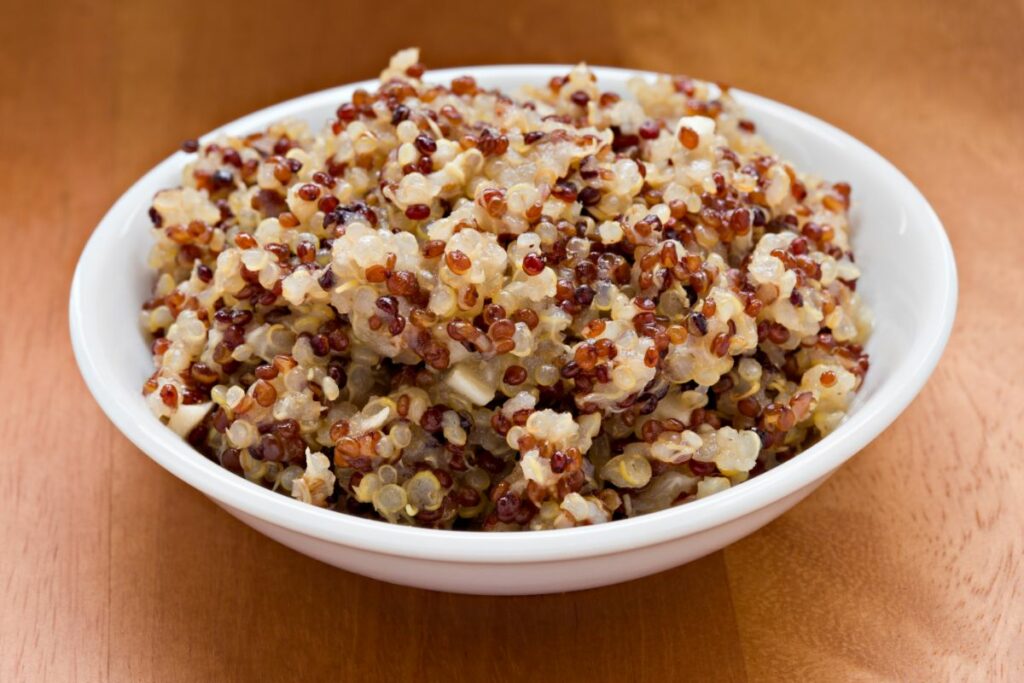I first heard about eating more alkaline foods on Instagram (of course, right?) and immediately wanted to see if grains or pseudo-grains fit into this category.
Alkaline foods are often touted as being good for health, but what exactly are they? Are there any grains that are alkaline? And is it worth to eat more of them?
What does alkaline mean?
In chemistry, an alkali is any chemical compound that has a high positive charge. In biology, alkaline refers to anything that makes up part of the blood plasma. The concept of alkaline and acidic foods is based on the pH scale, which measures the acidity or alkalinity of substances. The pH scale ranges from 0 to 14.0. Values below 7.0 are considered acidic, while values above 7.0 are alkaline or basic. A neutral pH is 7.0, while an alkaline pH is above 7.0. Anything below 7.0 is considered acidic.
Our bodies naturally produce acids when they metabolize food. For example, when we digest protein, our bodies create lactic acid. Lactic acid is created when muscle tissue breaks down.
Our bodies also produce carbon dioxide (CO2) when we breathe, and when we burn sugar. Acids can build up in our bodies when we don’t get enough water, exercise, or sleep. We also produce acids when we consume alcohol, caffeine, and processed foods.
How do I know which foods are alkaline?
To determine whether a particular food is alkaline or not, you have to look at its pH value. Most fruits and vegetables fall between 4.5 and 6.0.
Some examples include apples, bananas, blueberries, broccoli, carrots, kale, lettuce, oranges, peas, pears, spinach, strawberries, sweet potatoes, tomatoes, and zucchini.
Alkaline foods contain higher levels of potassium, magnesium, calcium, iron, zinc, phosphorus, sodium, copper, manganese, and vitamins B6, C, E, K, and D.
Why should you eat more alkaline foods?
There’s no doubt about it – the human body needs alkaline nutrients to survive. According to experts, a diet rich in alkaline foods is essential for maintaining optimal health, and can even lead to weight loss.
Here are just a few reasons why you should start incorporating more alkaline foods into your diet:
- Promotes better health: A diet rich in alkaline fruits and veggies provides your body with all the necessary nutrients it needs to not just survive, but thrive.
- Helps keep your body balanced: Eating more alkaline foods means you’ll be less likely to develop conditions like diabetes, heart disease, arthritis, and osteoporosis. A body that isn’t balanced creates hospitable environments for inflammation, which is a precursor to many common ailments.
- Boosts the immune system: Eating more alkaline foods will boost your immune system, making it easier to fight off colds and other illnesses
- Protects against cancer: Research shows that people who eat more alkaline foods have lower rates of cancer than those who don’t
- It improves mood: Eating more alkalizing foods can improve your mood, energy level, and overall sense of well-being
- It makes you smarter: According to research, eating more alkaline foods may increase your IQ by as much as 10 points
What are alkaline grains?
Alkaline grains refer to a group of foods that contain high levels of potassium (K) and magnesium (Mg). Also known as alkaline-forming grains, these are grains and pseudo-grains (which are not technically grains but are eaten like grains) that have an alkalizing effect on the body when metabolized.
Alkaline grains are those that, upon digestion, leave an alkaline residue in the body. They are believed to help balance the body’s pH levels, keeping it at an ideal balance, which can promote overall health. (An important note: the acidity or alkalinity of a food is not solely determined by its taste but rather its effect on the body’s internal environment after digestion.)
Grains with high levels of potassium and magnesium help maintain healthy blood pressure, regulate heart rate, and keep your body’s pH balance in check. They also play an important role in keeping bones strong, muscles relaxed, and nerves functioning properly.
The best way to get enough potassium and magnesium is through food sources like leafy greens, beans, nuts, seeds, fish, and of course–whole grains! Here are some good ones to consider:
1. Quinoa
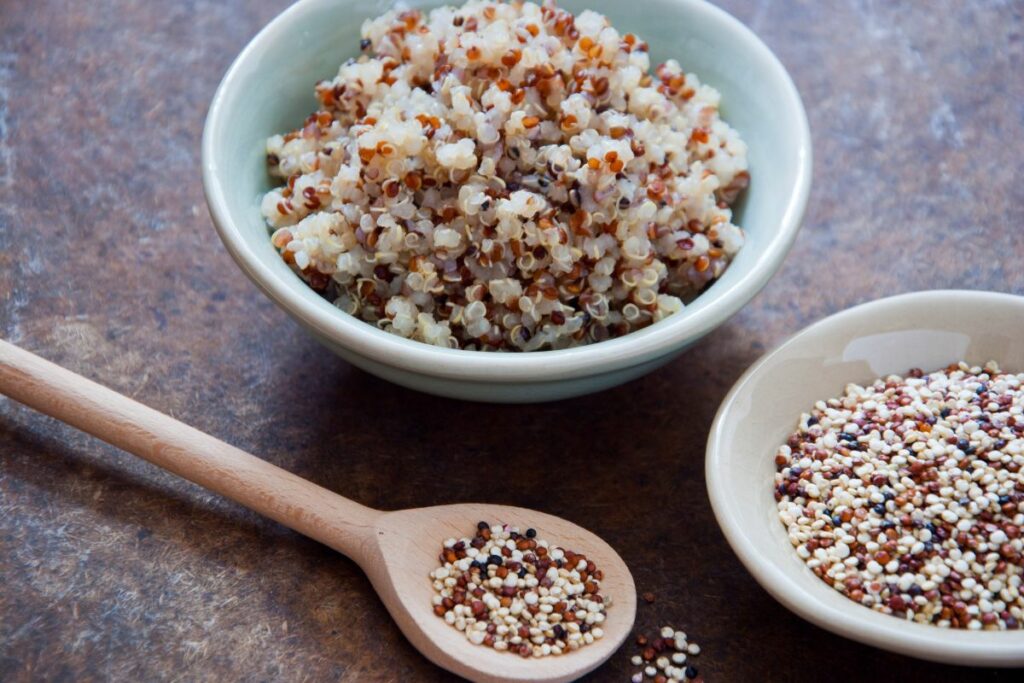
This ancient grain has been cultivated since at least 5,000 BC. It’s packed with protein, fiber, vitamins, and minerals, making it one of the best plant-based proteins out there. Experts believe Quinoa has the potential to offer several health benefits:
- Reducing inflammation: One of the main advantages of quinoa is its potential to reduce inflammation, and this makes it a great option for people who suffer from arthritis, multiple sclerosis, or other inflammatory conditions
- Improving digestion: Quinoa is also rich in dietary fiber, which helps promote regular digestion. Eating quinoa can improve your overall digestive system function, helping prevent constipation and diarrhea
- Boosting immunity: Quinoa contains lysine, an amino acid that supports immune system function. Lysine can be beneficial for those suffering from allergies because it reduces the production of histamine, a chemical compound that causes allergic reactions
2. Amaranth
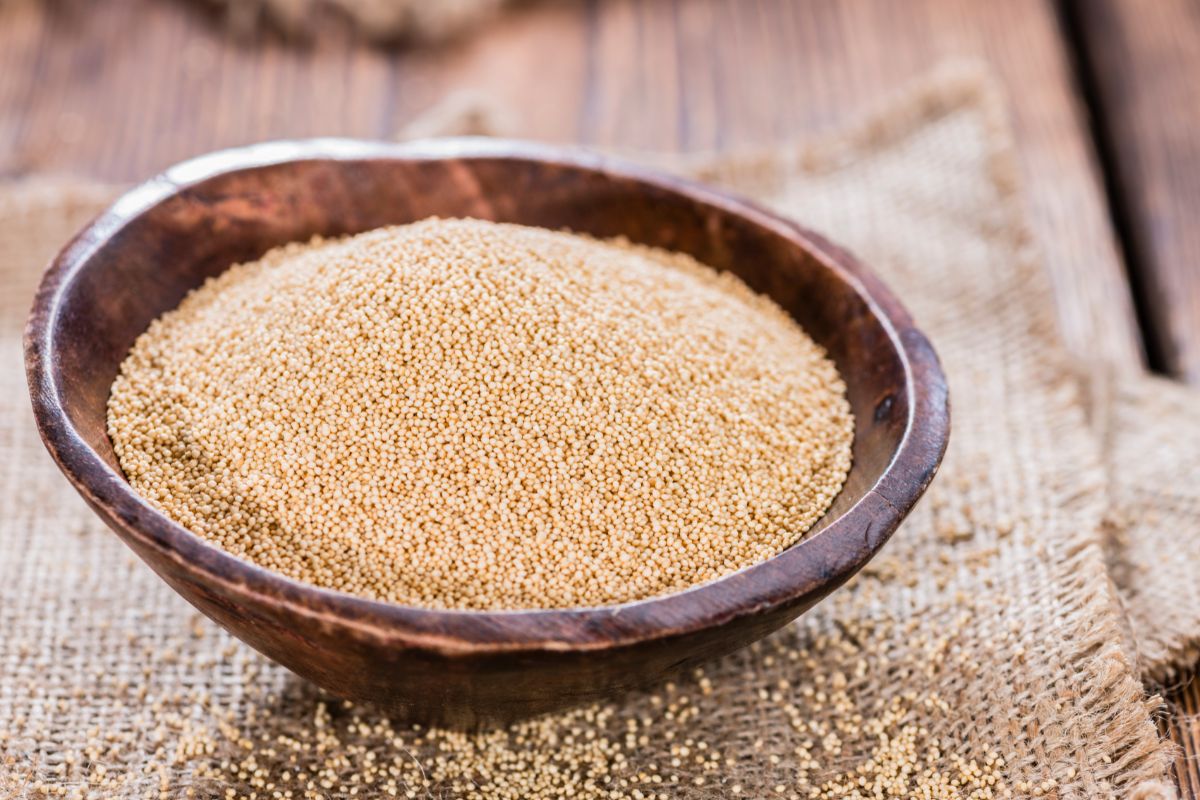
Amaranth is another ancient grain that dates back to around between 6000 and 8000 years ago. Similar to Quinoa, Amaranth is loaded with nutrients and fiber.
In fact, it boasts more than twice the amount of both compared to Quinoa! Some of the key benefits of Amaranth include:
- Promoting weight loss: Amaranth is a low-calorie food source, so it can keep you full longer for less calories, a goal for those trying to lose weight. One cup of cooked Amaranth is just over 100 calories, while still providing 8 grams of protein, 4 grams of fiber, and 2 grams of fat
- Providing fiber: Like Quinoa, Amaranth is a good source of dietary fiber, which promotes regular bowel movements and keeps things moving along smoothly
3. Millet
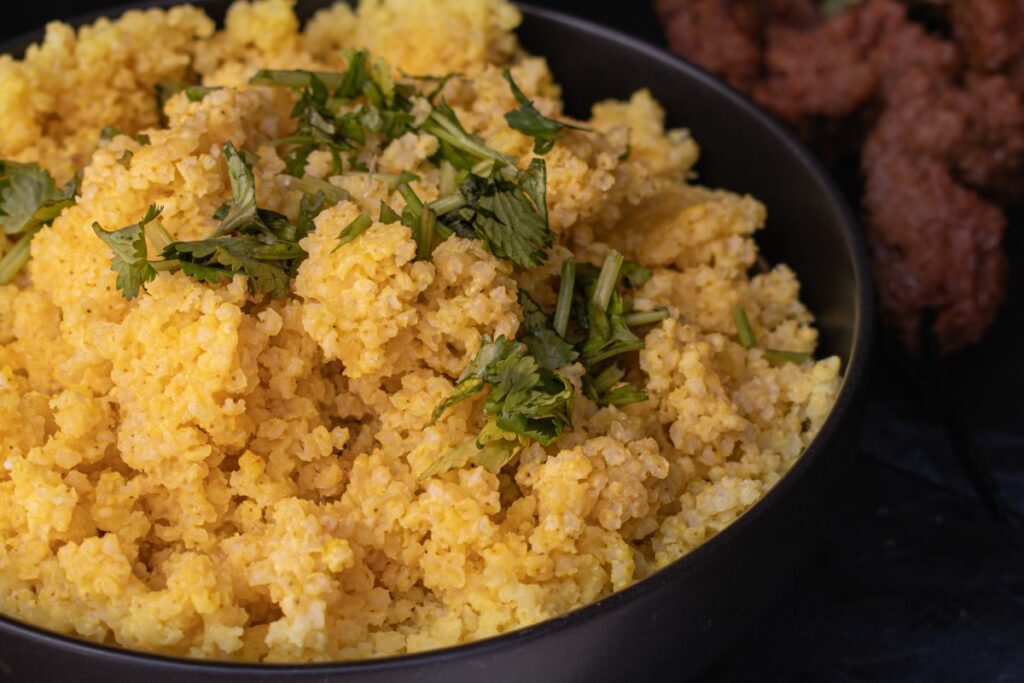
Millet is a small grain native to Africa and Asia. It’s similar to rice and corn in terms of appearance, but it tastes much sweeter. Millet is a gluten-free grain, and it’s also a complete protein source, meaning it contains all nine essential amino acids needed by the human body.
Some key advantages of millet include:
- Providing energy: Millet is a highly nutritious food source that provides energy without causing spikes in blood sugar. This is due to it’s high protein and complex carbohydrate mis, which are a slow and sustained source of energy. By releasing glucose into the bloodstream slowly, it helps maintain stable blood sugar levels, helping to prevent big spikes and dips
- Supporting bone health: Millet is also a good source of calcium, phosphorus, iron, zinc, and vitamin B6. All of these elements support bone health, keeping bones strong and healthy
4. Sorghum
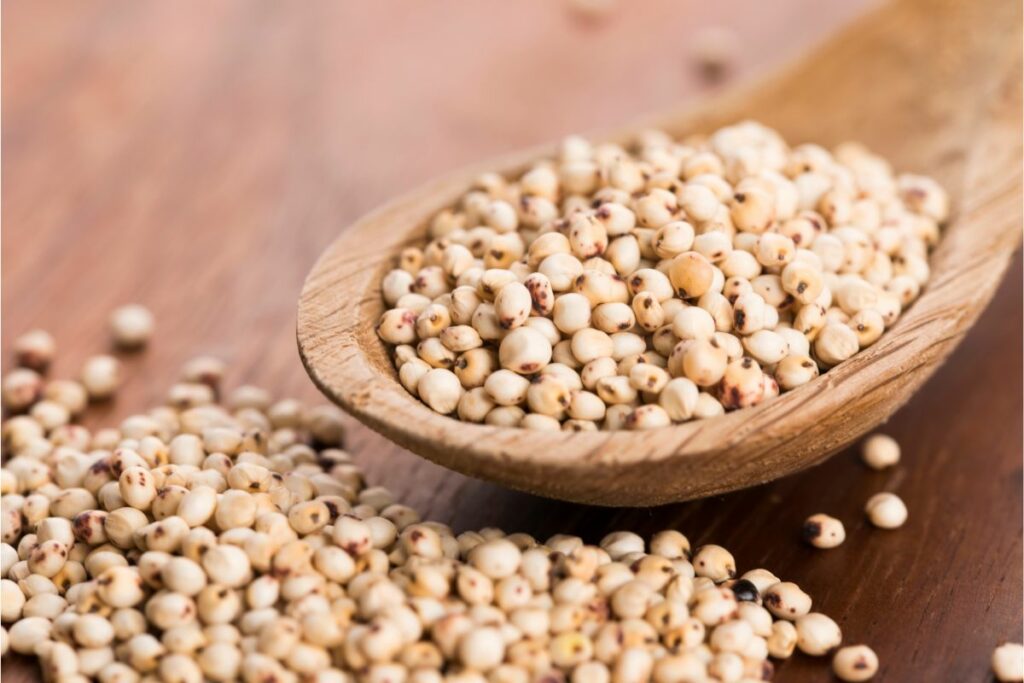
Sorghum is a type of grass that’s grown primarily in tropical regions. It’s been cultivated for thousands of years, and it was even one of the first crops domesticated by humans.
Sorghum is a gluten-free plant, and it’s also rich in minerals like calcium, iron, and zinc.
Some key health benefits include:
- Improving digestion: Sorghum helps improve digestion because it contains enzymes that break down carbohydrates into simple sugars
- Promoting weight loss: Sorghum may help promote weight loss because it contains less than half the amount of carbs found in most grains
5. Buckwheat
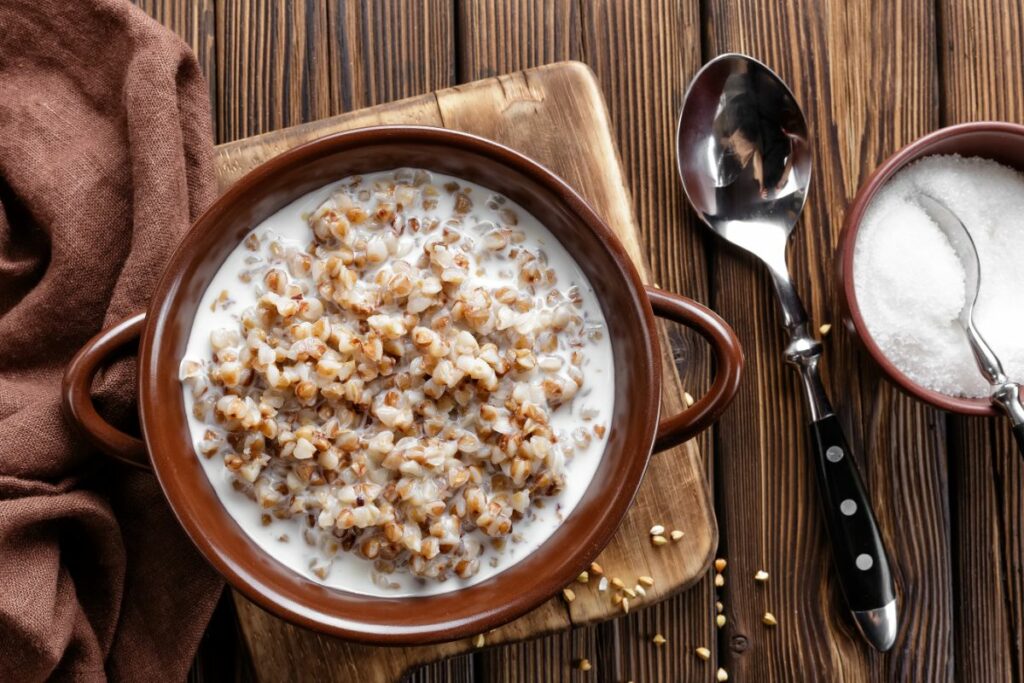
Buckwheat is actually not a true wheat at all, but rather a fruit seed related to rhubarb. However, it’s commonly referred to as “buckwheat” due to its resemblance to the cereal grain.
Buckwheat is a gluten-free grain, and it’s packed with antioxidants and other nutrients and is a good source of manganese, copper, magnesium, phosphorous, potassium, and vitamins A, C, E, and K.
Unlike the grains listed above, Buckwheat is actually considered an acid-forming food, not an alkaline-forming one. Its metabolic effect in the body results in an acid-forming residue.
Remember, the alkaline or acidic nature of a food is determined by the pH level of its ash after digestion. Acid-forming foods are those that leave an acidic residue when metabolized, potentially contributing to a slightly lower pH in the body. On the other hand, alkaline-forming foods leave an alkaline residue after digestion, which could help balance the body’s pH levels.
What are the benefits of alkaline grains?
Alkaline grains are an excellent way to increase your intake of alkalizing minerals. These minerals promote overall wellness and keep you feeling energized. They’re especially beneficial if you have a hard time getting enough sleep or feel sluggish during the day.
The old saying, you are what you eat, is true. I tell my kids all the time that their energy levels, how well they sleep, how often they use the restroom, and their overall well-being is directly related to the foods they eat. Unfortunately, most of us either grew up with no food education or (if you’re like me) had the now-outdated food pyramid telling you what to eat.
Our bodies are amazing and while certain foods may have an acidic or alkaline effect on the body, the body’s internal pH is tightly regulated by various physiological mechanisms, and the overall impact of specific foods on pH is relatively minimal.
Be aware of alkaline and acidic foods, specifically whole grains, but stay focused more on eating real, unprocessed food, as that will make the biggest difference!

